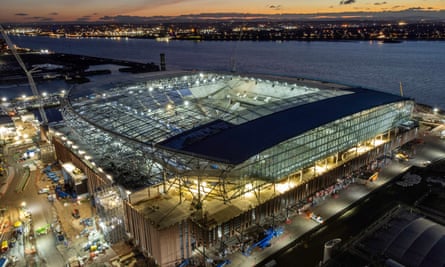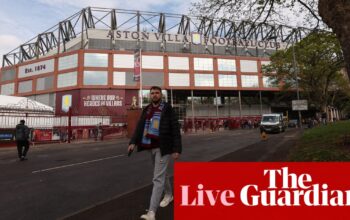Everton’s owner, Farhad Moshiri, has always sounded extremely confident that he will be selling the Premier League club to the US investment firm 777 Partners. In October last year he told Sky Sports News: “The more time that I have spent with the 777 team, the more my confidence increases that we have found the right people to take the club forward in the modern era.”
That comment is ageing less and less well.
The 777 deal appears more and more unlikely to complete, with a string of worrying stories about 777’s finances being trumped last Friday by the news that it is being sued for fraud in the US.
The complaint was filed in the southern district of New York by Leadenhall Capital Partners, which claims it was “induced” into lending 777 hundreds of millions of dollars after the investment company pledged more than “$350m in assets as collateral to Leadenhall, knowing all along that the assets either did not exist, were not actually owned by [777’s co-founder Josh] Wander’s entities, or had already been pledged to another lender”.
777 declined to comment.
The case is a civil matter and the allegations are unproven. But the problem for Everton is that the claim adds to the doubts that 777 will be able to acquire the club, which has been kept alive over the past eight months because of 777’s funding.
The US firm has loaned Everton about £192m – a debt which comes on top of the £225m Everton borrowed from Rights & Media Funding (RMF) and the £160m from a consortium of MSP Capital and wealthy Evertonians Andy Bell and George Downing.
These loans are straining the club’s balance sheet to its limits, resulting in Everton’s directors approaching Teneo – a global financial advisory firm with a large insolvency and restructuring division – for help.
Without 777’s cash injections – or fresh funding from elsewhere – the club would appear unable to meet all of its financial obligations.
Everton’s manager, Sean Dyche, indicated as much on Thursday as he outlined his fears that 777’s woes, coupled with the club’s creaking finances, could force the sale of his best talent this summer.
“If the takeover doesn’t happen, or a takeover, then it will probably be juggling dust, not sand,” he said. “I think that’s fair, because who knows then? You are having to self-generate everything then, I would imagine, because it’s not like there is a pile of cash anywhere.”

So if no takeover materialises – and player sales fail to plug the financial gaps – administration starts to become a possible scenario, as the approach to Teneo suggests.
This would probably mean the club being deducted another nine points – having lost eight this season for breaches of profitability and sustainability rules (PSR).
after newsletter promotion
However, if Everton beat Sheffield United at Goodison Park on Saturday, the team could be certain of Premier League survival even if they lost a further nine points – fuelling speculation that the club could enter administration next week.
This would be a more beneficial option for some than others.
It would probably mean that RMF and the MSP consortium are paid back, because each has security over Everton’s assets (property and bank accounts in the case of RMF and the new stadium development at Bramley-Moore Dock for MSP).
777 may receive some of its £192m back, as it is understood to have some subordinated security with RMF, meaning it starts to get money back after RMF has been repaid.
A further £450m of loans provided to Everton by Bluesky Capital, which the club’s accounts say is “controlled by” Moshiri, are not secured – suggesting administration would leave that company nursing huge losses. The 94% stake in Everton, which is held by a Moshiri Isle of Man company, would probably also be worthless.
But Moshiri would not be the only individual feeling the pain. Administrations often have harsh, real-world consequences for people who have never appeared in the Sunday Times Rich List.
Local companies and sole traders that supply the club with products and services – be they the match-day pies or the cleaning of the club’s offices – face the risk of not having their invoices paid. The jobs of some staff working for the club could also come under threat.
Everton have been approached for comment.
Source: theguardian.com


